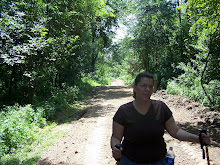
I've been reading an awful lot about food recently. Cookbooks, food magazines, and more importantly food production books. I'm fascinated and very disturbed by our current food industry. And Michael Pollan's book The Omnivore's Dilemma has been my Holy Grail of food books. I've been meaning to read this book since I was on our trip last year and thumbed through a copy of his In Defense of Food. So when my dad said he had finished Omnivore's, I grabbed it before he offered it to anyone else.
The Omnivore's Dilemma is that we have a huge variety of foods to eat as omnivores. A koala doesn't have to think about what's for dinner. It knows. Since it only eats eucalyptus, dinner plans are a snap. Humans are not like that. We eat almost everything. And as Americans this question of what to eat becomes even more complicated since we don't have a stable food culture. That is why food trends and diet fads seem to catch on so easily here. We simply don't know what we should eat. So the question of dinner becomes more complicated. And currently we are being pulled in three different directions although I would state that it is actually four.
Pollan divides the book into three sections but talks about four different ways of producing/finding food. The first section is about King Corn and the industrial food production industry. That is the industry that drove me to become a vegetarian. This is the food system of McDonalds, Oreos, and frozen meals. It is about processed food and most of that food comes from corn in some way or another. Americans have created a monoculture of corn and now derive a good chunk of our food from corn and corn products. Pollan actually ran a McDonalds meal through a mass spectrometer (which breaks down substances into their various parts) and found that very high percentages of the food was based on corn. Soda 100%, a hamburger almost 60%. Pollan points out how unsustainable this type of food production is and that although the cost of food is low, the cost to health, environment, and animals is very high.
The next section is about two different types of food production. The first is organic, which Pollan says can be either local organic or industrial organic. This is food grown without fertilizers, pesticides, growth hormones, and other chemicals. It is a significantly more healthy food choice but Pollan points out that industrial organic also relies on monocultures and are often as intensively farmed as conventional crops. Instead Pollan focuses on pasture farming, which he describes as beyond organic. This is the ideal farm. No need for pesticides, or fertilizers. The animals that are raised (this is a mostly beef, chicken, egg, and rabbit farm) live actual animal lives and are slaughtered humanely. The farmer calls himself a grass farmer. He grows the grass that the cows live on. After the cows are pastured, the chickens are brought into the field to find insects and help spread the cows' manure for fertilizer. It is what chickens naturally do. These are the farmers' egg laying chickens and broiler chickens. The animals are then moved from field to field as the grasses return to health. It is a closed system and nothing goes to waste. It is what farms used to be before we started planting more corn than we could eat. Pollan uses an actual farm, Polyface Farms in Virginia.
The last section is dedicated to hunting and gathering. While Pollan agrees that this is not a practical way to feed ourselves it is something that brought him the most pleasure. He decides to make a meal out of things he has either hunted or gathered on his own. He tells the tale of pig hunting with friends (his first hunting experience and possibly his last). He describes the joy he takes in mushroom hunting for morels and chantrelles. He gathers wild yeast and bakes his own bread. He finds wild fruits that provide him with a dessert. And when all is done he gathers all the friends who have helped him hunt and gather and has a huge meal. He says that this was the most satisfying meal he had since he provided all of the ingredients themselves.
Pollan finishes each chapter with a meal from that style of food production. He shows the differences between each type of food along with facts on each industry style. I've read several books in the last year on food production but not one of them summed things up as wonderfully as this one. Pollan has written a disturbing and beautiful and informative book that covers all aspects of the food industry. So much of what I have written lately is an attack on the industrial food industry which offers me little options. By looking at different food systems, Pollan offers us a chance to chose. A beautiful book that made me hungry and sad and hopeful.


2 comments:
I thought of you a few days ago when I heard that Mark Bittmann just wrote an all vegetarian cookbook. Just a thought.
I will have to take a look. I enjoy his simple approach to cooking and have been looking for good vegetarian cookbooks. Thanks!
Post a Comment